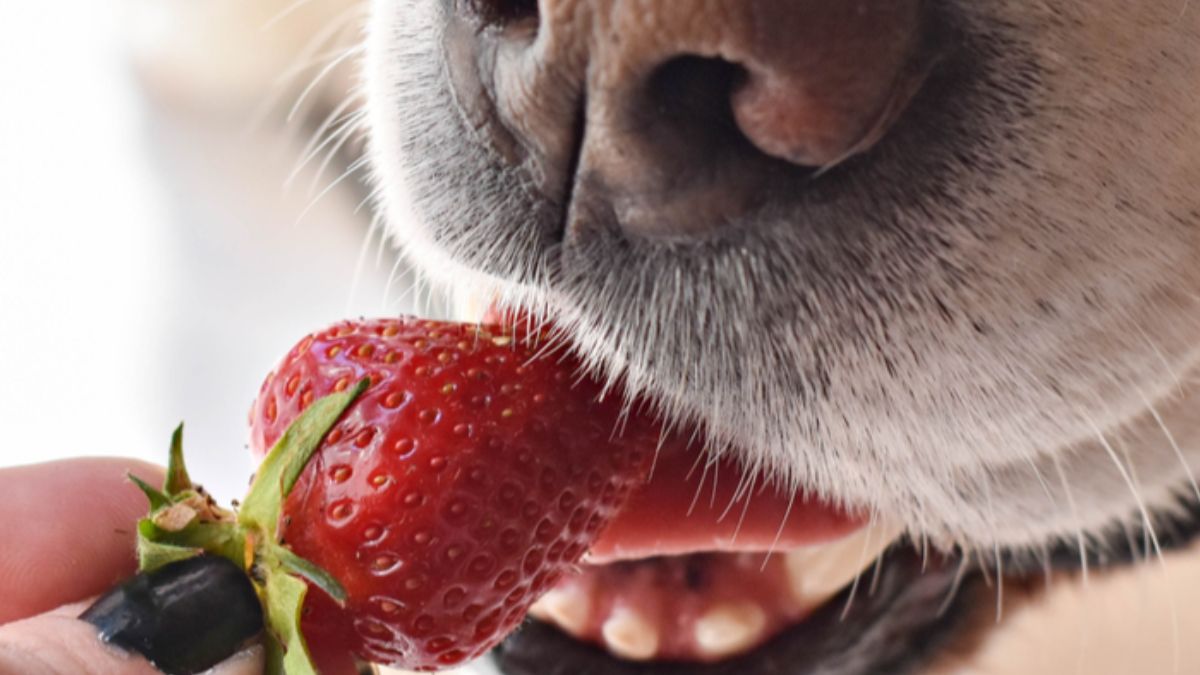Can Dogs Eat Strawberries? Many dog owners worry that the things we eat might be harmful to their four-legged pals, and vice versa. Strawberry is a wonderful fruit that people often have questions about. Humans love these delicious red berries, and for good reason: they’re packed with nutrients. However, do dogs share our love of strawberries? In this piece, we’ll investigate whether or not strawberries are a good snack for canines.
Are Strawberries Safe for Dogs?
Thankfully, the correct response is “yes.” In moderation, strawberries are fine to feed to your dog. They’re delicious and healthy, so you can feel good about including them in your pet’s regular diet. However, before you go ahead and give your dog strawberries, there are certain things you should know.
Benefits of Strawberries for Dogs
Because of their inherent nutritional qualities, strawberries are beneficial to a dog’s health in a number of ways. These tasty berries are nutrient dense without being very caloric. They include a lot of vitamin C, which helps keep your immune system healthy and works as an antioxidant. Fiber is another health benefit of strawberries, which helps with digestion and keeping the weight down. They are a wonderful source of antioxidants and other nutrients like potassium and manganese that contribute to general health.
Feeding Strawberries to Your Dog
Even though strawberries are good for your dog, there are several precautions you should take to make sure they stay healthy:
- Moderation is Key: While strawberries are healthy for dogs, you should only offer them a small amount at a time. Due to their high fiber content, strawberries can cause stomach distress and diarrhea in dogs if given in excess. Your dog should not consume more than 10 percent of his or her total daily caloric intake from goodies like strawberries.
- Preparation and Serving: Wash the strawberries properly to remove any pesticides or debris before giving them to your dog. Choking hazards exist in the form of the stem and leaves, thus they must be removed. Cut the strawberries into little pieces to make them easier to chew and swallow.
- Introduce Gradually: Introduce strawberries to your dog gradually and see how they react if they have never had them before. Although it is uncommon, some dogs may have an allergy to strawberries. Stop giving strawberries and talk to your vet if you see any signs of an allergic response, like itchiness, vomiting, or diarrhea.
- Fresh or Frozen: Both fresh and frozen strawberries are safe for your dog to eat. Frozen strawberries are a tasty treat on a hot day and a welcome break for puppies that are teething. Strawberries are healthy for dogs on their own, but offering them strawberries in sugary syrups or with extra sweeteners can be dangerous.
Expanding Further on the Topic
- Health Considerations: Your dog’s health can benefit from eating strawberries because they are good for the dog’s heart. Strawberries may lower one’s risk of developing chronic diseases like cancer thanks to the antioxidants they contain. The high vitamin C concentration of strawberries also aids in collagen formation, which is great for your dog’s skin and coat.
- Weight Management: Strawberries are a great option for dogs trying to lose weight because of their low calorie content. Joint troubles and diabetes are only two of the many health problems that can arise from a dog’s excessive weight. Strawberries are low in calories and can be used as a tasty incentive for your dog while also encouraging them to keep a healthy weight.
- Dental Health: Strawberries are good for your dog’s teeth and gums when he or she chews on them. The natural roughness of the fruit aids in the removal of plaque and the promotion of healthier gums and teeth. Strawberries may help your pet’s teeth, but they are no substitute for regular brushing and visits to the vet.
- Allergies and Sensitivities: While most dogs should be fine eating strawberries, some may have fruit sensitivities or allergies. It’s important to keep an eye on your dog if you’re feeding him or her strawberries for the first time. Allergic reactions can manifest in a variety of ways, including itching, skin rashes, swelling, and digestive problems. Stop giving strawberries and see your vet if any negative reactions occur.
- Other Safety Precautions: There are other safety considerations to keep in mind while giving strawberries to your dog besides the possibility of an allergic reaction. Strawberries that have been sprayed with pesticides or other chemicals should not be fed to your dog. When possible, buy organic strawberries. Stems and leaves should also be removed because they present a choking hazard.
- Other Fruits for Dogs: Strawberries are great for your pet’s health, but it’s also important to provide them a range of other fruits. Blueberries, seedless melons, apples without the core, and bananas are other acceptable fruits for canines to eat. It’s important to remember that introducing new fruits should be done so slowly and moderately to avoid causing stomach problems.
Conclusion
Can Dogs Eat Strawberries? When fed in moderation and properly cooked, strawberries may be a delicious and nutritious addition to your dog’s diet. Strawberries are a great treat for your dog or cat because they are low in calories, full of beneficial nutrients, and taste great. However, before making any major nutritional changes, it is important to examine your dog’s particular needs, potential allergies, and speak with your veterinarian.
Can Dogs Eat Strawberries? Keep in mind that the keys to your dog’s long-term health and happiness are a food that is both balanced and appropriate, as well as frequent exercise and medical treatment. When you eat some strawberries, you can safely and happily share them with your faithful canine companion.

